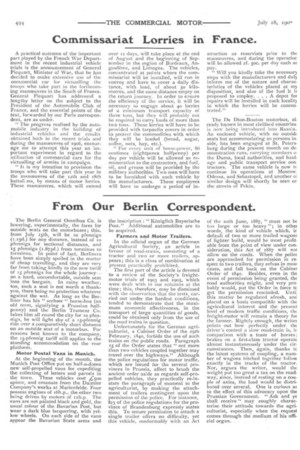From Our Berlin Correspondent.
Page 24

If you've noticed an error in this article please click here to report it so we can fix it.
The Berlin General Omnibus Co. is lowering, experimentally, the fares for outside seats on the motorbuses ; this, from July 15th, will be ro pfennigs r.25c1.) for any distance, instead of in pfennigs for sectional distances, and 15 pfennigs (1.875d.) from terminus to terminus. In point of fact, Berliners have been simply spoiled in the matter of cheap travelling, and they are very far from taking kindly to the new tariff of 15 pfennigs for the whole journey— on a hard, uncomfortable, outside seat into the bargain. In rainy weather, too, Such a seat is not worth a thankyou, there being no protection whatever .against the wet. As long as the Berliner has his " sechser " horse-bus (an old term, signifying a Prussian halfpenny) and the Berlin Tramcar Co. takes him all round the city for FO pfennigs, he will fight shy of a is-pfennig ride over a comparatively short distance on an outside seat of a motorbus. For reasons best known to the company, the rs-pfennigtariff still applies to the standing accommodation on the rear platform.
Motor Postal Vans in Munich.
At the beginning of the month, the Munich Post Office put on half-a-dozen new self-propelled vans for expediting the collecting of letters and parcels in the town. These vehicles cost £soo apiece, and emanate from the Daimler Company's works at Marienfelde. Four possess engines of 16h.p., the other two being driven by motors of 1211.p. The vans are not painted black and gold, the usual colour of the Bavarian Post, but wear a dark blue lacquering, with yellow wheels. On each side of the vans appear the Bavarian State arms anti
nd the
the inscription : " Koniglich Bayerische Post." Additional automobiles are to be acquired.
Farmers and Motor Trailers.
In the official organ of the German Agricultural Society, an article in favour of road-trains, consisting of a tractor and two or more trailers, appears; this is a class of combination at present practically prohibited.
The first part of the article is devoted to a review of the Society's freightmotor trials of 1903 and 1905, which were dealt with in our columns at the time; this, therefore, may be dismissed with the observation that the tests, car. ried out under the hardest conditions, tended to demonstrate that the maximum economic effectiveness, in the transport of large quantities of goods, could be obtained only from the use of the road trains in question.
Unfortunately for the German agriculturist, a Cabinet Order of the zoth February, 1840, forbids the use of such trains on the public roads. Paragraph 15 of the Order states that " not more than two vehicles coupled together may travel over the highways." Although the police regulations for motor traffic, which are issued for the several provinces in Prussia, affect to brush the ancient order aside as regards self-propelled vehicles, they practically re-instate the paragraph of moment to the agriculturist, by making the attachment of trailers contingent upon the permission of the police. For instance, §23 of the police regulations for the province of Brandenburg expressly states this. To secure permission to attach a single trailer offers no difficulty, yet this vehicle, conformably with an Act of the 20th June, 1887, " must not be too large or too heavy "; in other words, the kind of vehicle which, ir default of two or more trailed wagoni of lighter build, would be most profitable from the point of view under consideration, this Act of 1887 will nol allow on the roads. When the police are approached for permission in respect to two trailers, they refuse in most cases, and fall back on the Cabinet Order of 1840. Besides, even in the event of permission being granted, the road authorities might, and very pro. bably would, put the Order in force k get the permission rescinded. Untii this matter be regulated afresh, and placed on a basis compatible with the agricultural interest and the preseni level of modern traffic conditions, the freight-motor will remain a theory for the farmer. Rightly enough, the writer points out how perfectly under the driver's control a slow road-train is, ii comparison with a team of horses ; brakes on a first-class tractor operate almost instantaneously under the circumstances. Then, again, thanks tc the latest systems of coupling, a num. ber of wagons hitched together follow exactly in the tracks of the tractor. Nor, argues the writer, would the weight put too great a tax on the road. way, since, instead of resting on a couple of axles, the load would be distributed over several. One is curious as to the effect of this advocacy upon the Prussian Government. "Ask and ye shall receive may roughly charac. tense their attitude towards the Agri. culturist, especially when the request comes through the medium of his official organ.


























